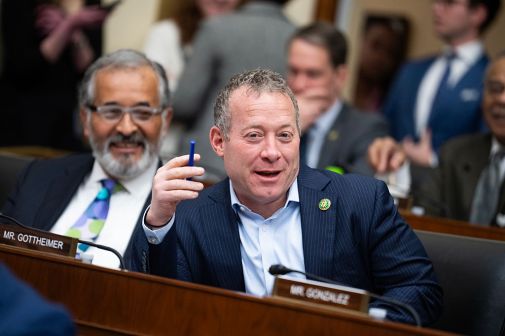Sen. Warner wants updates on agencies’ DATA Act progress

The author of the Digital Accountability and Transparency Act wants an update from federal agencies on how they are implementing the 2014 law’s mandate to make their budget data machine readable.
Sen. Mark Warner, D-Va., issued a letter Wednesday to more than 35 federal agencies asking if they are on time with the law’s deadlines, how much it has spent on the fulfilling the law’s mandates and what budgetary or other resources would be needed to close any additional gaps.
“I recognize the challenges that ongoing implementation of the law may present for agencies, including budget constraints, dependence on government-wide guidance from the Office of Management and Budget and the Department of the Treasury, and the complexity of incumbent systems and business processes,” Warner writes. “However, by prioritizing implementation of the law and fully leveraging its potential, I believe that the opportunities for your agency outweigh these challenges.”
The law sets a deadline of May 9, 2017, for agencies to make their financial, budget, payment, grant and contract data machine readable when published to USASpending.gov, the federal government’s hub of publicly available financial data. The data would allow the public to track money through multiple points of the spending process, from appropriation to awards to dissemination, and to easily incorporate it into software applications that can then be used to track government spending.
The Treasury Department and OMB have been working with agencies through various deadlines and pilot programs over the last year. Treasury has been updating progress through an open beta on USASpending.gov. Meanwhile, the Department of Health and Human Services is in the middle of a two-year pilot to test how data standardization will work across agencies.
[Read more: HHS to lead 2-year DATA Act pilot]
Despite this work, the Government Accountability Office issued a report in January saying the Obama administration has to do a better job of tightening data standards and issuing technical guidance related to the act. Additionally, Gene Dodaro, Government Accountability Office comptroller general, told the Senate Budget Committee Wednesday that federal financial data is still unreliable.
“If a publicly-owned company on the stock market was unable to be audited because of the poor conditions of its records, investors would run away from it. But we can’t run away from a government in which we are all stakeholders. This is an enterprise in which we – and our children — are all invested,” Sen. Mike Enzi, R-Wyoming, said in release.
“Passing legislation is just the first step, and I will continue to press administration and agency officials to move forward to effectively implement and fully leverage the results of this powerful new tool for fiscal transparency,” Warner said in a statement Wednesday.
Read Warner’s full letter below.
As you are aware, on May 9, 2014 President Obama signed into law the Digital Accountability and Transparency (DATA) Act of 2014 (Pub.L. 113–101), which I introduced in Congress. When fully implemented the DATA Act will create transparency for federal funds, set government-wide financial data standards, reduce recipient reporting requirements, and improve overall data quality. The efforts of individual federal agencies are essential to achieving the aims of the law, and I write to bring attention to those efforts at your agency.
The DATA Act presents both challenges and opportunities for federal agencies. Improving the quality and completeness of spending data, including by fully linking financial and account data, will enable agencies to improve internal management and to target resources for maximum impact. While data informs policy making and financial decision-making in government, as well as for external stakeholders, without consistent data standards these decisions are often made in the absence of some existing information. I also recognize the challenges that ongoing implementation of the law may present for agencies, including budget constraints, dependence on government-wide guidance from the Office of Management and Budget (OMB) and the Department of the Treasury, and the complexity of incumbent systems and business processes. However, by prioritizing implementation of the law and fully leveraging its potential, I believe that the opportunities for your agency outweigh these challenges.
I appreciate your efforts thus far to implement the DATA Act and fully leverage this potential. To date, agencies should also be adhering to the steps outlined in the DATA Act Implementation Playbook issued by the Department of the Treasury, and to other guidance issued by Treasury and OMB. Leading agencies have issued individual implementation plans in line with OMB guidance, formed DATA Act teams, participated in government-wide deliberations on standards, developed an inventory of data, identified systems containing relevant data, and assessed needed policy and technical changes. Crucially, your agency should also have designated a DATA Act lead, a senior accountable official responsible for planning and implementing changes to systems and business processes, determining how best to map data elements from existing systems to the DATA Act Schema, and overseeing the testing and submission of data. By learning from best practices at leading agencies and providing adequate funding for implementation, your agency can leverage these requirements for better internal management and overall governance in the long term.
I remain strongly committed to robust oversight of DATA Act implementation and to ensuring that federal agencies are able to fully implement this crucial law. To that end, I would appreciate you sharing the following information with me:
1 – What resources has your agency spent on implementation of the DATA Act to date? Does your agency have any existing contracts aimed at facilitating implementation?
2 – Has your agency issued a DATA Act implementation plan in line with the DATA Act Playbook? If so, please share this plan with me.
3 – How has implementation to date varied from your expectations, and what challenges have you encountered?
4 – What resources does your agency anticipate needing in order to fully implement the DATA Act moving forward?
If I can be of assistance in addressing implementation challenges at your agency, please contact my office at 202-224-2023. Thank you again for your efforts to prioritize the implementation of the DATA Act and to fully leveraging the potential of this exciting opportunity to transform federal spending and governance.
Sincerely,
Mark R. Warner
United States Senator
Contact the reporter on this story via email at greg.otto@fedscoop.com, or follow him on Twitter at @gregotto. His OTR and PGP info can be found here. Subscribe to the Daily Scoop for stories like this in your inbox every morning by signing up here: fdscp.com/sign-me-on.






